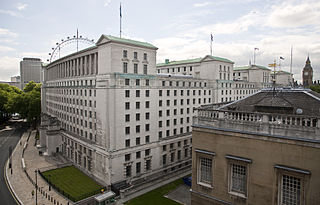
The Ministry of Defence is a ministerial department of the Government of the United Kingdom. It is responsible for implementing the defence policy set by the government and serves as the headquarters of the British Armed Forces.

The Type 45 destroyer, also known as the D or Daring class, is a class of six guided-missile destroyers built for the United Kingdom's Royal Navy in the early 21st century. The class is primarily designed for anti-aircraft and anti-missile warfare and is built around the PAAMS air-defence system using the SAMPSON Active electronically scanned array (AESA) and the S1850M long-range radars. The first three destroyers were assembled by BAE Systems Surface Fleet Solutions from partially prefabricated "blocks" built at different shipyards; the remaining three were built by BAE Systems Maritime – Naval Ships. The first ship in the Daring class, HMS Daring, was launched on 1 February 2006 and commissioned on 23 July 2009.

The Atomic Weapons Establishment (AWE) is a United Kingdom Ministry of Defence research facility responsible for the design, manufacture and support of warheads for the UK's nuclear weapons. It is the successor to the Atomic Weapons Research Establishment (AWRE) with its main site on the former RAF Aldermaston and has major facilities at Burghfield, Blacknest and RNAD Coulport.
The Future Rapid Effect System (FRES) was the name for the British Ministry of Defence (MOD) programme to deliver a fleet of more than 4,000 armoured fighting vehicles for the British Army. The vehicles were to be rapidly deployable, network-enabled, capable of operating across the spectrum of operations, and protected against current threats. The programme has now been split into two separate procurement projects for a reconnaissance Specialist Vehicle (SV) and an aspiration for a future Utility Vehicle (UV). The General Dynamics Ajax was selected to fulfill the SV requirement in 2016.
Bowman is the name of the tactical communications system used by the British Armed Forces.
In the United States, the processes of government procurement enable federal, state and local government bodies in the country to acquire goods, services, and interests in real property. Contracting with the federal government or with state and local public bodies enables interested businesses to become suppliers in these markets.

The River-class destroyer, formerly the Canadian Surface Combatant (CSC), and Single Class Surface Combatant Project is the procurement project that will replace the Iroquois and Halifax-class warships with up to 15 new ships beginning in the early 2030s as part of the National Shipbuilding Procurement Strategy.
Government procurement or public procurement is undertaken by the public authorities of the European Union (EU) and its member states in order to award contracts for public works and for the purchase of goods and services in accordance with principles derived from the Treaties of the European Union. Such procurement represents 13.6% of EU GDP as of March 2023, and has been the subject of increasing European regulation since the 1970s because of its importance to the European single market.

The Dreadnought class is the future replacement for the Royal Navy's Vanguard class of ballistic missile submarines. Like their predecessors they will carry Trident II D-5 missiles. The Vanguard submarines entered service in the United Kingdom in the 1990s with an intended service life of 25 years. Their replacement is necessary for maintaining a continuous at-sea deterrent (CASD), the principle of operation behind the Trident system.

The BAE Systems Taranis is a British demonstrator programme for unmanned combat aerial vehicle (UCAV) technology, under development primarily by the defence contractor BAE Systems Military Air & Information. The aircraft, which is named after the Celtic god of thunder Taranis, first flew in 2013. An unmanned warplane, the Taranis is designed to fly intercontinental missions, and would carry a variety of weapons, enabling it to attack both aerial and ground targets. It uses stealth technology, giving it a low radar profile, and is controllable via satellite link from anywhere on Earth.
Government procurement or public procurement is when a governing body purchases goods, works, and services from an organization for themselves or the taxpayers. In 2019, public procurement accounted for approximately 12% of GDP in OECD countries. In 2021 the World Bank Group estimated that public procurement made up about 15% of global GDP. Therefore, government procurement accounts for a substantial part of the global economy.

The Minister of State for Defence Procurement and Industry is, as a Minister of State, a mid-level defence minister in the Ministry of Defence of the British Government. The current incumbent of the post, Labour MP Maria Eagle, was appointed in July 2024.

The BAE Systems Nimrod MRA4 was a planned maritime patrol and attack aircraft intended to replace the Hawker Siddeley Nimrod MR2. The rebuilt aircraft would have extended the operating life of the Nimrod fleet by several decades and significantly improved the aircraft by installing more efficient Rolls-Royce BR700 turbofan jet engines to almost double the flight range. The conversion of the flight deck to a digital glass cockpit would have simplified control operations and reduced crew requirements. New detection systems were to be installed, as well as additional weapons for anti-submarine warfare.

The Ministry of Defence Police (MDP) is a civilian special police force which is part of the United Kingdom's Ministry of Defence. The MDP's primary responsibilities are to provide armed security and counter terrorism services to designated high-risk areas, as well as uniformed policing and limited investigative services to Ministry of Defence property, personnel, and installations throughout the United Kingdom. The MDP are not military police. Service personnel often refer to the MDP by the nickname "MOD plod".

The Defence Reform Act 2014 is an Act of the Parliament of the United Kingdom concerned with defence procurement and the UK Reserve Forces, particularly the Territorial Army. It has 51 sections and seven schedules.

The UK Military Flying Training System (UKMFTS) takes UK armed forces aircrew from initial training through elementary, basic, and advanced flying training phases, preparing them for their arrival at their designated operational aircraft units. It is operated by Ascent Flight Training, a consortium of Lockheed Martin and Babcock International under a 25-year Private Finance Initiative (PFI) contract for the UK's Ministry of Defence (MoD), with oversight from the MoD. The airworthiness authority for each aircraft type, for example, is fulfilled by military and civilian staff within Defence Equipment and Support. Apart from the overall contract, the main elements of the system include fixed-wing elementary, multi-engine and fast-jet pilot training, rear crew training and rotary-wing (helicopter) training.

The Ministry of Defence Main Building or MOD Main Building, also known as MOD Whitehall or originally as the Whitehall Gardens Building, is a grade I listed government office building located on Whitehall in London. The building was designed by E. Vincent Harris in 1915 and constructed between 1939 and 1959 on part of the site of the Palace of Whitehall, specifically Pelham House, Cromwell House, Montagu House, Pembroke House and part of Whitehall Gardens. It was initially occupied by the Air Ministry and the Board of Trade before becoming the current home of the Ministry of Defence in 1964.
The Air Support to Defence Operational Training (ASDOT), was a proposed programme whereby training in defence for aircrew in the armed forces of the United Kingdom would be provided by a civilian contractor. It was to include all air training undertaken under the umbrella of the Ministry of Defence (MOD); Royal Air Force (RAF), Fleet Air Arm (FAA), the Army Air Corps (AAC) and any units which came under the aegis of Joint Forces Command. The project was originally scheduled to go live in 2020, with training being folded into the programme when existing measures and contracts expired. The project was cancelled in March 2019 and re-launched in October 2021.
General Dynamics UK is the British subsidiary of the American defence and security corporation General Dynamics. Founded in London in 1962, the company has grown to include eight sites across the United Kingdom, including in Bristol, Chippenham, Hastings, Merthyr Tydfil, Oakdale and Rotherham. Specialising in armoured fighting vehicles, avionic systems and tactical communications, the company has produced the General Dynamics Ajax armoured fighting vehicle, the Ocelot light protected patrol vehicle and the Bowman communications system. It is one of the UK's leading defence companies and a key supplier to the UK Ministry of Defence.
At around £290 billion every year, public sector procurement accounts for around a third of all public expenditure in the UK. EU-based laws continue to apply to government procurement: procurement is governed by the Public Contracts Regulations 2015, Part 3 of the Small Business, Enterprise and Employment Act 2015, and the Public Contracts (Scotland) Regulations of 2015 and 2016. These regulations implement EU law, which applied in the UK prior to Brexit, and also contain rules known as the "Lord Young Rules" promoting access for small and medium enterprise (SMEs) to public sector contracts, based on Lord Young's Review Growing Your Business, published in 2013.












